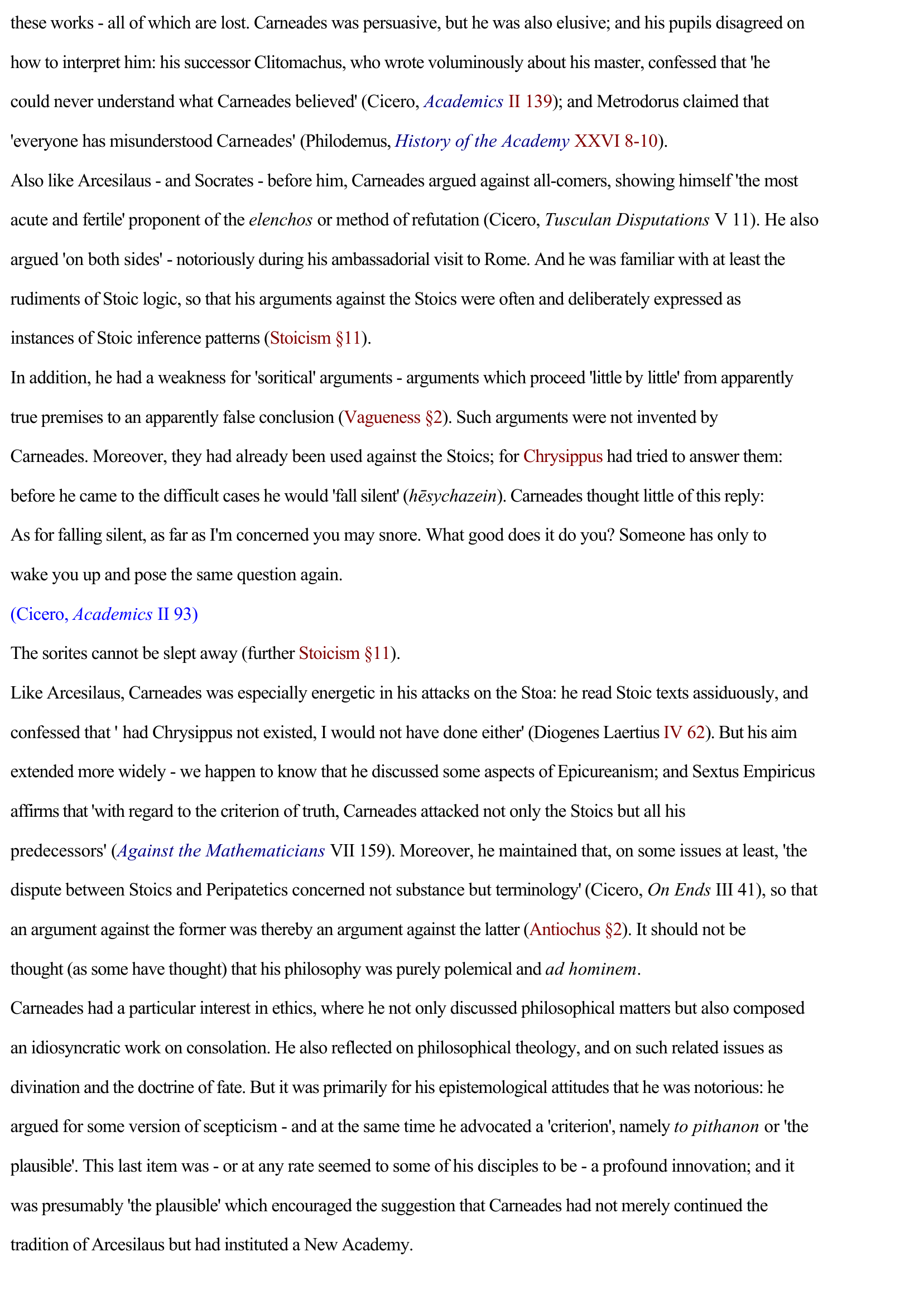Carneades
Publié le 22/02/2012
Extrait du document
«
these works - all of which are lost.
Carneades was persuasive, but he was also elusive; and his pupils disagreed on
how to interpret him: his successor Clitomachus, who wrote voluminously about his master, confessed that 'he
could never understand what Carneades believed' (Cicero, Academics II 139 ); and Metrodorus claimed that
'everyone has misunderstood Carneades' (Philodemus, History of the Academy XXVI 8-10 ).
Also like Arcesilaus - and Socrates - before him, Carneades argued against all-comers, showing himself 'the most
acute and fertile' proponent of the elenchos or method of refutation (Cicero, Tusculan Disputations V 11).
He also
argued 'on both sides' - notoriously during his ambassadorial visit to Rome.
And he was familiar with at least the
rudiments of Stoic logic, so that his arguments against the Stoics were often and deliberately expressed as
instances of Stoic inference patterns ( Stoicism §11 ).
In addition, he had a weakness for 'soritical' arguments - arguments which proceed 'little by little' from apparently
true premises to an apparently false conclusion ( Vagueness §2 ).
Such arguments were not invented by
Carneades.
Moreover, they had already been used against the Stoics; for Chrysippus had tried to answer them:
before he came to the difficult cases he would 'fall silent' (hēsychazein ).
Carneades thought little of this reply:
As for falling silent, as far as I'm concerned you may snore.
What good does it do you? Someone has only to
wake you up and pose the same question again.
(Cicero, Academics II 93)
The sorites cannot be slept away (further Stoicism §11 ).
Like Arcesilaus, Carneades was especially energetic in his attacks on the Stoa: he read Stoic texts assiduously, and
confessed that ' had Chrysippus not existed, I would not have done either' (Diogenes Laertius IV 62 ).
But his aim
extended more widely - we happen to know that he discussed some aspects of Epicureanism; and Sextus Empiricus
affirms that 'with regard to the criterion of truth, Carneades attacked not only the Stoics but all his
predecessors' (Against the Mathematicians VII 159).
Moreover, he maintained that, on some issues at least, 'the
dispute between Stoics and Peripatetics concerned not substance but terminology' (Cicero, On Ends III 41), so that
an argument against the former was thereby an argument against the latter ( Antiochus §2 ).
It should not be
thought (as some have thought) that his philosophy was purely polemical and ad hominem .
Carneades had a particular interest in ethics, where he not only discussed philosophical matters but also composed
an idiosyncratic work on consolation.
He also reflected on philosophical theology, and on such related issues as
divination and the doctrine of fate.
But it was primarily for his epistemological attitudes that he was notorious: he
argued for some version of scepticism - and at the same time he advocated a 'criterion' , namely to pithanon or 'the
plausible' .
This last item was - or at any rate seemed to some of his disciples to be - a profound innovation; and it
was presumably 'the plausible' which encouraged the suggestion that Carneades had not merely continued the
tradition of Arcesilaus but had instituted a New Academy..
»
↓↓↓ APERÇU DU DOCUMENT ↓↓↓

































